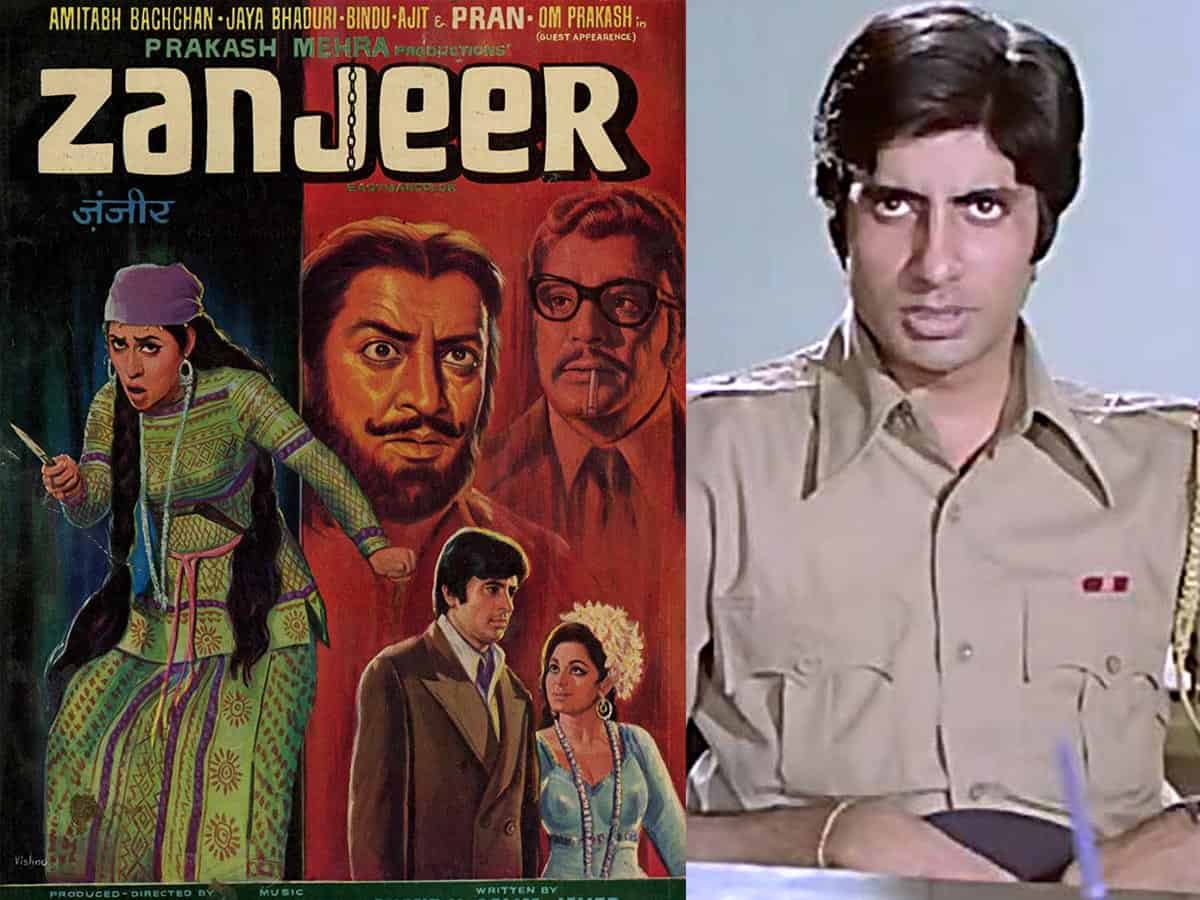
At this time, fifty years ago, film fans were flocking to movie theatres all over India to see a new hero and watch a film with a new theme. Little did they know that the tall and lanky hero who had captured their imagination would later become the biggest superstar that Bollywood had ever seen. Today, even after the passage of five decades he remains a popular figure on the silver screen and television.
The hero was Amitabh Bachchan and the film was Zanjeer which was released on 11th May 1973. It was the creation of the writers Salim Khan and Javed Akhtar and directed by Prakash Mehra. The story that Salim-Javed wrote for Zanjeer proved to be a game-changer and set the trend in films for many years to come.
After Zanjeer the duo produced hit after hit and wrote scripts with Amitabh in mind. They worked together on 22 Bollywood films and two Kannada films.
The craze for Angry Young Man
The film Zanjeer heralded the start of the Angry Young Man era. Till then the public had been lapping up the soft romantic themes of Rajesh Khanna’s films but underneath this façade, a need for change was brewing. Salim-Javed sensed it and came up with Zanjeer. It was a gamble but their hunch was right. Although Raj Kapoor’s Bobby was the biggest hit of 1973, Zanjeer was placed at number four as far as the box office was concerned.
In the same year, Salim-Javed also wrote the film Yaadon Ki Baraat starring Dharmendra, Tariq, Zeenat Aman, Neetu Singh and others which had the same emotion of revenge as its theme. That too was a hit among the fans. So the writers were convinced that they had correctly guessed the mood of the public. Tapping into this emotion, the writers later wrote Deewar, Trishul and the greatest blockbuster Sholay.
It came at the right time
In many ways, Zanjeer was a pivotal film in Indian cinema, It established Amitabh Bachchan as a leading actor. Would it have been a success if released today? Probably not. In life, everything has a right time and place and Zanjeer’s correct time was in 1973. Many factors came together and made it a block buster.
It was in Zanjeer that Amitabh Bachchan found his right image. His intense expression, brooding eyes and his dialogue delivery, seemingly full of hidden meanings and menace, were perfect for the role of the police inspector Vijay Khanna. The inspector had witnessed the murder of his parents when he was a child and has been haunted by that memory for many years.
His whole life was devoted to a single goal – to find the criminal who killed his parents and bring him to justice. Needless to say, the master criminal was none other than Ajit while the usual Bollywood villain Pran played a different role, that of a Pathan named Sher Khan who becomes friends with the police inspector. Another ally of the inspector is the heroine Mala (Jaya Bhaduri who became Jaya Bachchan after marriage).
In 1973 the mood of the public was ready for a film like Zanjeer. The day-to-day problems of life in Indian society were becoming difficult to tackle. People were fed up with rising prices and widespread corruption. The usual theme of romance and singing songs in gardens was beginning to lose its charm. The people wanted something new that would reflect their anger and their wish for change.
Superb music
The plot of Zanjeer tackled issues of crime and the struggle of an individual against a dysfunctional system. It introduced a gritty perspective to Bollywood cinema. The director Prakash Mehra successfully brought a new cinematic style to the film. He skillfully blended action, drama, and social commentary elements, creating a gripping narrative that captivated the audience.
The music too was superb. Especially the Afghan-style song Yaari Hai Iman Mera sung by Pran as Sher Khan (playback singer Manna Dey). That song is still sung at many cultural programmes.
So overall, the film became a big hit due to its unique narrative, Amitabh Bachchan’s breakthrough performance, the direction of Prakash Mehra, Salim-Javed’s powerful dialogue, memorable music, and its ability to address relevant social issues. The film put Amitabh Bachchan on the road to superstardom and also left an impact on Indian cinema, ushering in a new phase of realistic storytelling.
